VMBS Recognizes 2024 Outstanding Alumni, Rising Stars
The Texas A&M College of Veterinary Medicine & Biomedical Sciences (VMBS) recognized seven former students at the 2024 Outstanding Alumni & Rising Star Awards Ceremony on May 17.
The Outstanding Alumni Award is the highest honor bestowed by the school and recognizes those who have reached a level of success in their professional careers that brings credit to both the individual and their alma mater. Honorees may be graduates of the Doctor of Veterinary Medicine professional program, graduate academic programs, or biomedical sciences undergraduate program.
Established in 2013, the Rising Star Award recognizes graduates who have completed their education within the last 10 years. These outstanding former students have made significant professional accomplishments early in their careers including public service and volunteer activities that serve to positively reflect upon their alma mater.
Videos about each of the award recipients are available on YouTube and more photos from the ceremony are available on Flickr.
Outstanding Alumni: Dr. Helene Andrews-Polymenis ‘01
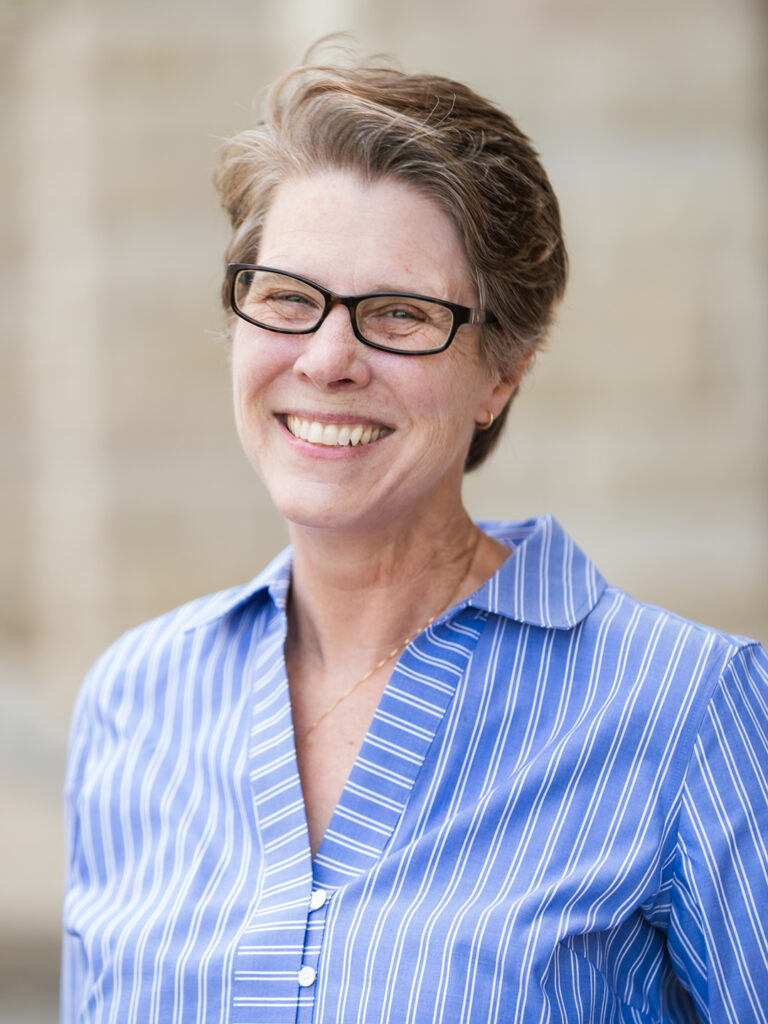
For more than two decades, Dr. Helene Andrews-Polymenis has been transforming the field of molecular microbiology through innovative research and impeccable leadership in the greater scientific and veterinary medical communities.
After receiving her bachelor’s degree from Brown University, Andrews-Polymenis graduated in 1999 from the Tufts University Graduate School of Biomedical Sciences with her Ph.D. in molecular biology and microbiology. She completed her thesis work in the laboratory of National Academy of Sciences member Dr. Ralph Isberg. Her doctoral dissertation work on pneumonia-causing bacteria laid the groundwork for decades of pathogen research and has been cited more than 800 times by her peers.
Andrews-Polymenis began her training in veterinary medicine at Tufts and completed her Doctor of Veterinary Medicine degree at Texas A&M University in 2001 after she and her young family moved to College Station. After completing her academic work, Andrews-Polymenis joined the laboratory of esteemed microbiologist Dr. Andreas Bäumler, then an associate professor at the Texas A&M School of Medicine and now a professor at the University of California, Davis, and member of the National Academy of Science.
Today, Andrews-Polymenis is a professor in the Texas A&M School of Medicine’s Department of Microbial Pathogenesis and Immunology and has a joint appointment in the College of Veterinary Medicine & Biomedical Sciences’ Department of Veterinary Pathobiology.
Since the beginning of her faculty career, Andrews-Polymenis has been conducting groundbreaking research in the development and transmission of infectious diseases that impact both animals and humans, including Salmonella. Overseeing her own laboratory since 2005, her work is focused both on the mechanisms that infectious bacteria use to cause disease, as well as the traits of a host animal that influence disease outcomes after infection.
As such, Andrews-Polymenis’ research has continuously pushed boundaries. Most recently, in 2023, she and collaborators published a paper that effectively solved a 30-year-old mystery regarding bacterial retrons, which are segments of DNA that contribute to bacterial defense against viruses.
“This work represents a fundamental advance in microbiology and in our understanding of these DNA segments,” one nominator said. “These advances were made possible by the pioneering genetic approaches of Dr. Andrews-Polymenis.”
Andrews-Polymenis also continues to raise the bar for academic excellence, not only in her contributions to basic and applied science but also in her willingness to make resources available to the wider scientific community. She and her longtime collaborator, Michael McClelland, developed a collection of nearly 4000 Salmonella deletion strains that they share for free with anyone working in the field.
According to one nominator, “Several of the genomic tools developed in the Andrews-Polymenis laboratory proved to be valuable resources to the community, especially because they were distributed free to scientists in the community who requested them. The two papers describing these sets of genomic tools have been cited together over 300 times, reflecting their great utility to the field.”
In 2018, Andrews-Polymenis was awarded a Presidential Impact Fellowship, one of Texas A&M’s most prestigious scholarly awards, recognizing “rising stars in their respective fields, and those who embody the university commitment to advancing knowledge through transformational learning, discovery, innovation, and impact for Texas and the world.”
In 2023, she was elected to become a Fellow in the American Academy of Microbiology, a highly prestigious national and international honor. In addition, Andrews-Polymenis has been invited to share her knowledge at dozens of national and international events and has served as a reviewer and editor for many of her profession’s highest-ranking academic publications.
Andrews-Polymenis is also an outstanding mentor to young scientists. One nominator noted that she has successfully guided seven postdoctoral fellows and eight doctoral graduate students in her laboratory, the great majority of whom have become independently funded research scientists as a consequence of her influence and example in discovery science. She also has mentored approximately 30 undergraduate researchers in her laboratory, many of whom have continued on to medical school, veterinary school, and other professional science based pursuits.
“Dr. Andrews-Polymenis has distinguished our college, our profession, and her career as a trendsetting and exceptional basic and applied science investigator,” one nominator said. “On top of all these marvelous achievements, Dr. Andrews-Polymenis has not lost her deep character, charming personality, and unassuming, open nature while serving as a profound role model for the veterinary medical profession.”
Outside of these accomplishments, Andrews-Polymenis was, for several years, a deputized voter registrar, who enjoyed registering people to vote, teaching voting basics, and volunteering for several candidates for public office.
In 2019, she was diagnosed with pancreatic cancer and through this experience, developed an interest in advocacy for cancer patients. In her free time, she now serves as the patient advocate external advisory board member for the Pancreatic Cancer Stromal Reprogramming Consortium, is a board of directors member for Let’s Win PC!, is an elected member of the National Cancer Institute Pancreas Task Force and Patient Advocate Steering Committee, and is the chief operating officer of the Targeting Resistance in Cancer Consortium.
Andrews-Polymenis lives in College Station with her husband, Michael, also an academic scientist. She enjoys spending time with their two adult daughters, Aggela and Athena, traveling both for pleasure and to visit family in the Pacific Northwest and in Greece.
Outstanding Alumni: Dr. Warren L. Beard ‘83 (awarded posthumously)
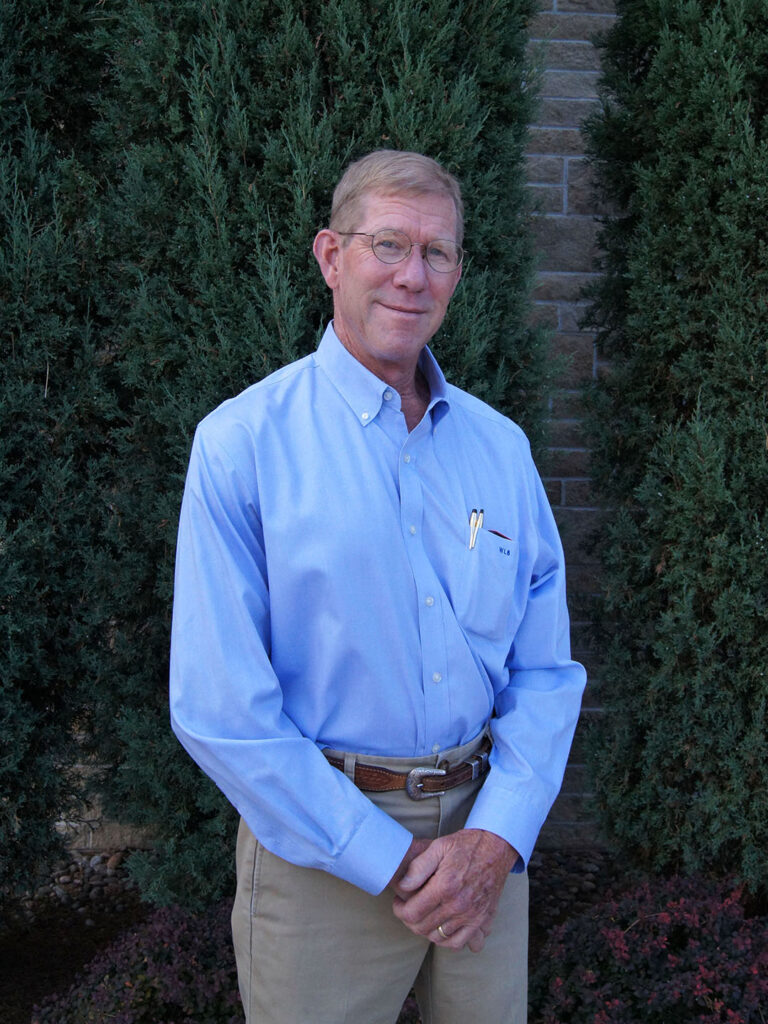
Dr. Warren L. Beard was an excellent equine clinician and surgeon, committed mentor, quick-witted researcher, and beloved colleague and friend. His research set the stage for continued advancements in both veterinary and human medicine and his mentorship molded decades of students into exceptional equine surgeons, veterinarians, and well-rounded individuals, thus ensuring his legacy continues for generations to come.
Beard discovered his passion for veterinary medicine as a child growing up in Houston and New Orleans and spending time with his uncle, Dr. Edward “Booster” Stephenson, an Aggie veterinarian from the class of 1963. Beard followed in his uncle’s footsteps, graduating magna cum laude from Texas A&M University with his bachelor’s degree in veterinary science in 1982 and his Doctor of Veterinary Medicine degree in 1983.
He spent two years in private practice in Dickinson, Texas, before beginning the equine surgical residency program at The Ohio State University. While working to complete his three-year residency, Beard also earned a master’s degree in veterinary clinical sciences.
In 1988, Beard accepted a faculty position in equine surgery at Ohio State and became a diplomate of the American College of Veterinary Surgeons the following year. In 2004, he joined the Kansas State University faculty as a professor of equine surgery.
“Dr. Beard worked to ensure that procedures were properly performed and horses provided with exceptional care,” one nominator shared. “His primary objective was to establish an accurate diagnosis to ensure that everyone on the surgery training team learned from the process of evaluation and to provide the client and patient with appropriate therapeutic options.”
Throughout his tenures at Ohio State and Kansas State, Beard actively participated in research and clinical studies, resulting in 72 scientific publications and numerous invited presentations to the ACVS, the European College of Veterinary Surgeons, and the Veterinary Orthopedic Society. His research interests focused on the equine upper airway and enhanced patient care, ranging from effective bandaging techniques to National Institutes of Health-funded cancer research.
Beard’s impact on the veterinary profession also included his role as a mentor and teacher. He guided 35 people through their surgical training programs, with 31 of his trainees now serving as board-certified veterinary surgeons and the remaining currently completing their training.
His annual teaching efforts included providing 17 credit hours of lecture, overseeing 12 laboratory courses, and developing and delivering a surgical skills course with 14 additional laboratories for third-year veterinary students.
“Dr. Beard taught his students and residents excellent surgical skills,” one nominator recalled. “More importantly, he taught us to think, how to accept and handle the uncertainty that accompanies clinical practice. He also imparted problem-solving skills and instilled in us the courage to engage in difficult conversations that accompany unexpected outcomes and inevitable complications and clinical errors.”
Beard received seven awards related to his teaching and mentoring activities, including being named honored mentor by the ACVS Foundation.
“Warren was a giant with shoulders for many to stand upon to achieve success,” another nominator said. “He led with quiet conviction, dedication, and dry humor. I have never met a more loyal person, and he was what everyone strives for in equine practice — truly amazing in his career while defining himself by his family and personal passions. I am a better veterinarian, surgeon, and person because he was my mentor.”
Beard enjoyed life in Olsburg, Kansas, where he lived with his wife, Dr. Laurie Beard, and their two children, Nat and Anne, before his death on July 24, 2023. In his time off, he enjoyed fly fishing, skiing, hunting, and working cows; his passion for living life beyond the job demonstrated the importance of work-life balance and served as a model for young veterinarians.
Outstanding Alumni: Dr. Bo A. Brock ‘90
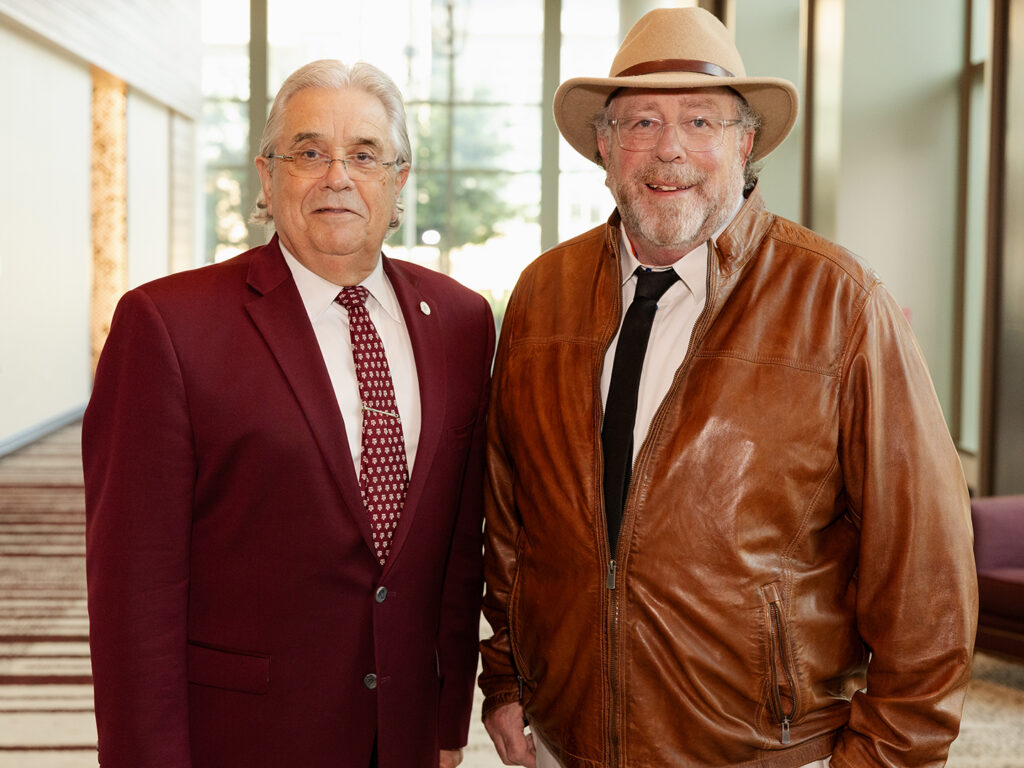
Dr. Bo A. Brock has played a role in shaping the future of veterinary medicine since graduating at the top of his Doctor of Veterinary Medicine class at Texas A&M University in 1990.
Brock began his veterinary career at a mixed-animal clinic in Clarendon, Texas, and in 1992, pursued his life-long goal of opening a high-quality horse practice in West Texas when he purchased a clinic composed of a few buildings in Lamesa.
He transformed those buildings into Brock Veterinary Clinic and began serving the rural community, with 750 active clients in his first year. Today, the clinic has more than 39,000 active clients, sees over 10,000 horses annually, employs 11 veterinarians, and serves patients from 2,300 zip codes.
“When Dr. Brock first established the clinic, he had a dream to create one of the best equine veterinary clinics in Texas,” a nominator said. “Today, Brock Veterinary Clinic acts as one of the most popular equine clinics in the areas of West Texas and Eastern New Mexico. People will travel hours seeking care offered by Dr. Brock and his clinic.”
In addition to setting the standard for veterinary care in the region, Brock also achieved a childhood goal inspired by his favorite horse, Sadie Jane, when he developed a surgical procedure to treat cyst-like lesions in the navicular bone in horses’ hooves. He published a peer-reviewed article describing the procedure and travels throughout North America showing veterinarians how to perform the surgery.
Brock’s passion for veterinary medicine has inspired countless young people with veterinary aspirations. He has opened his practice doors to more than 500 students from all over the world and has provided mentorship to more than 40 interns in his three decades of veterinary service.
“One of the most remarkable aspects of Dr. Brock’s mentorship and teaching is his ability to connect with students, interns, and employees on a personal level,” one of his former mentees said. “Through open communication, approachability, and genuine care, Dr. Brock has created an environment where students feel valued and empowered to explore their potential.”
Brock is one of 88 equine specialty veterinarians certified by the American Board of Veterinary Practitioners and has taken on many leadership roles throughout his veterinary career. He is a founder of the Texas Equine Veterinary Association and has served on the Texas Veterinary Medical Association Board of Directors for 10 years.
His passion for connecting with others eventually led Brock to write and publish “Crowded in the Middle of Nowhere,” a humorous book about the life of a small-town veterinarian, which has sold approximately 100,000 copies since it was published in 2007.
He also has published a monthly column for DVM 360, the leading magazine for veterinarians in private practice, and for the American Quarter Horse Journal, with a circulation of more than 220,000.
“Dr. Brock’s communication skills — combined with his efforts as practitioner, educator, leader in organized veterinary medicine, and author of lay and technical reports — has made him one of the most recognized figures in equine veterinary medicine,” one nominator said. “His expertise has improved the health of horses and has elevated the knowledge and clinical skills of everyone he has helped train and guide.”
Brock lives in Lamesa on a 20-acre vineyard, where he and his wife of 37 years, Kerri, raised three daughters and now enjoy the company of their seven grandchildren. When Brock is not at the vet clinic, he’s fly-fishing in Colorado on the property he purchased using the proceeds from his book.
Outstanding Alumni: Dr. Rob L. Coke ‘96
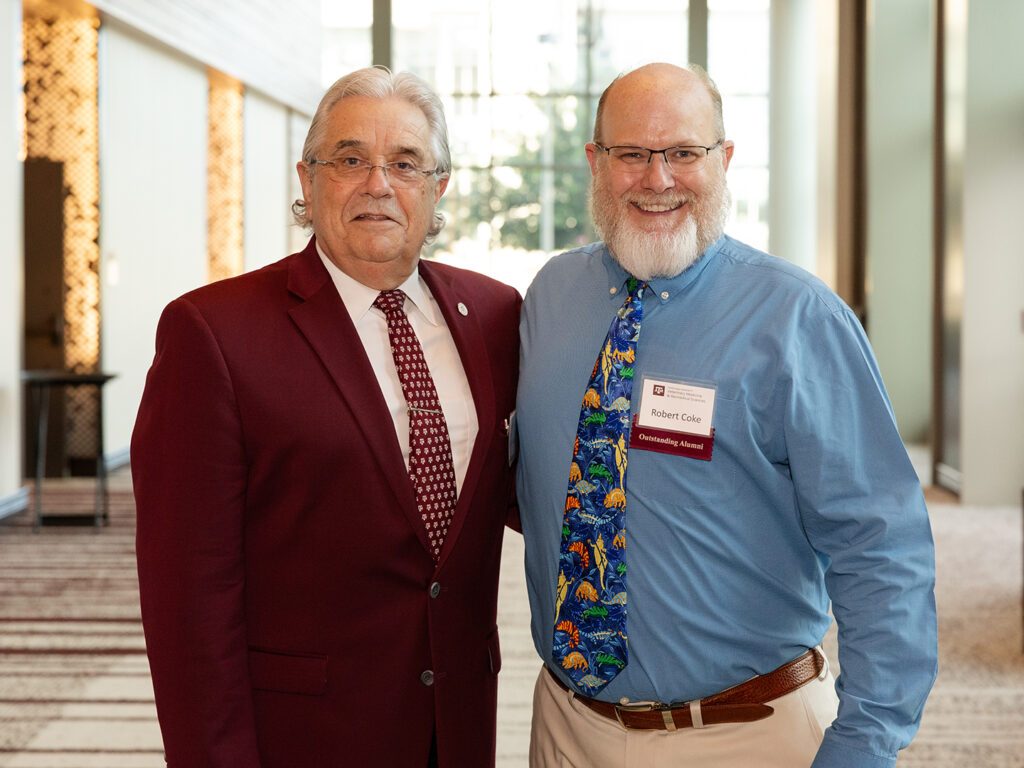
As the longest-tenured full-time veterinarian in the San Antonio Zoo’s 110-year history, Dr. Rob L. Coke is well-known across Texas for his expertise in zoological, exotic animal, and wildlife medicine.
Coke graduated from Texas A&M University with a Bachelor of Veterinary Science degree in 1994 and a Doctor of Veterinary Medicine degree in 1996. He spent four years treating exotic pets in private practice before going to Kansas State University for an exotic animal, wildlife, and zoo animal medicine internship, which he followed with a zoological medicine residency at the Oklahoma City Zoo.
In 2002, Coke began his career at the San Antonio Zoo as a senior staff veterinarian before moving up to become the director of veterinary care and then the senior director of veterinary care, the position in which he currently serves.
“Rob has earned the trust and respect of his staff as well as zoo executives. He was instrumental in leading his team in establishing protocols to protect endangered species during the SARS-CoV-2 pandemic, as well as ensuring the zoo’s at-risk species, including lions, tigers and primates, were at the front of the line to receive vaccinations for the SARS-CoV-2 virus,” one nominator said.
Since joining the San Antonio Zoo, Coke has led the veterinary department to more than double its number of employees and has overseen the largest-ever expansion of the zoo’s veterinary hospital, which included the addition of a pharmacy, laboratory, and sterile surgical facilities.
In his day-to-day role, Coke runs the administration of the zoo’s veterinary functions while still finding time to treat animals, mentor trainees, develop new animal care techniques, and coordinate educational tours.
“Perhaps Dr. Coke’s most noteworthy character trait is his strong passion and enthusiasm for teaching, mentoring, and coaching others, with the rare ability to communicate difficult concepts so that all are able to understand,” another nominator said.
In 2022, Coke was recognized by the Texas Veterinary Medical Association as the Non-Traditional Species Practitioner of the Year. He was also a 2021 finalist in the national American Humane Hero Veterinarian of the Year awards.
Coke has held membership and leadership roles in several professional organizations, including the Association of Reptilian and Amphibian Veterinarians, the American Association of Zoo Veterinarians, the American College of Zoological Medicine, and the American Board of Veterinary Practitioners. He is also certified in veterinary acupuncture with the International Veterinary Acupuncture Society and regularly uses his alternative medicine skills to treat animals at the San Antonio Zoo.
“He has helped so many exotic patients of the community by sharing his knowledge of husbandry and compassion for the species,” another nominator said. “His accomplishments and knowledge of exotic veterinary medicine are of great value to the veterinary profession.”
Coke has also contributed to many peer-reviewed publications regarding exotic animal care and the development of new and more effective treatment methods.
“Dr. Coke is an avid scholar, gifted leader, distinguished professional, and exceptional teacher,” another nominator said. “He has dedicated over 23 years to the advancement of standards and knowledge in his field. His contributions will carry forward lasting positive impacts for many years to come.”
Coke lives in San Antonio with his wife, Heidi, and his two children, Elan, 15, and Keaton, 11. His hobbies include reptile and amphibian husbandry, medical and nature photography, miniatures painting, and sport fly fishing.
Outstanding Alumni: Dr. Jon J. “Jason” Drake ‘93, ‘95
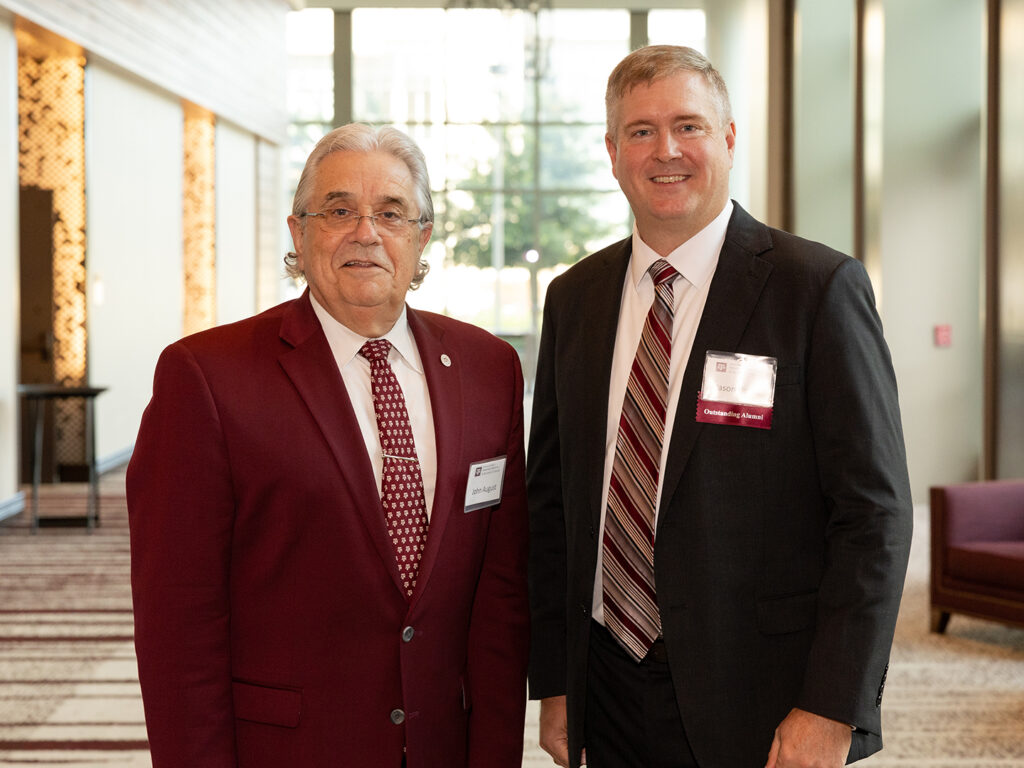
In his nearly three decades of service to the veterinary industry, Dr. Jon J. “Jason” Drake has enhanced the field of veterinary parasitology through his marketing and research activities, while also serving his country as an active member of the U.S. Army Reserve as an officer in the Veterinary Corps.
Drake graduated from Texas A&M University in 1993 with two bachelor’s degrees, one in veterinary medicine and one in biomedical sciences. After also earning his Doctor of Veterinary Medicine degree from Texas A&M in 1995, he moved to Longview, Washington, where he spent five years in private practice.
Drake then began his career in industry at Novartis Animal Health, initially in Florida as a professional services veterinarian before making the move into a marketing role as the product manager for surgical devices. He moved to Canada in 2007 as the director of marketing, supporting marketing teams overseeing both livestock and companion animal products, and then returned to the U.S. as the director of professional services.
Shortly before Elanco Animal Health acquired Novartis Animal Health in 2015, Drake began a new position as a technical services manager in global marketing for companion animal parasiticides, a position that evolved into a research advisor for global marketing at Elanco Animal Health. During this time, he also obtained board certification in parasitology through the American College of Veterinary Microbiologists.
Drake joined Merck Animal Health in 2022 to begin his current position as the director of scientific marketing affairs for global companion animal parasiticides, for which he provides clinical and scientific expertise for new product development, participates in research to explore parasite prevalence and expand product knowledge, and engages with key opinion leaders in veterinary parasitology from around the world.
“Throughout his 23 years of experience within industry, Dr. Drake has been instrumental in the advances of the companion animal veterinary parasitology market, developed and implemented international programs, managed relationships and represented his company with various key external organizations within parasitology, and conducted various product launches across at least seven countries and five continents, always demonstrating exemplary professionalism and leadership,” one nominator said.
In 2016, Drake joined the Army Reserve as a veterinary corps officer in the 994th Medical Detachment (Veterinary Services), through which he provides veterinary care to military working dogs and helps mitigate the risks of food- and waterborne infections for military personnel. He deployed to southwest Asia for 10 months in 2020 to support Operation Spartan Shield, during which he was recognized in the news for his efforts to save a military working dog’s life; he also conducted two missions in South America in 2023 to support Tradewinds 2023.
“His cumulative and continuous contributions to veterinary medicine, veterinary parasitology, and to the U.S. Army are truly remarkable,” another nominator said. “He has consistently upheld the values to which Texas A&M Aggies, and especially Aggie veterinarians, aspire.”
During his career, Drake has authored or co-authored more than 30 peer-reviewed publications with over 1,100 citations.
“Perhaps the most notable feature of Dr. Drake’s career is his commitment to publishing research while working in the private sector,” another nominator said. “He embodies the highest Aggie ideals and epitomizes scholarly research excellence.”
Drake was recently selected to participate in the American Association of Veterinary Parasitologists’ Hookworm Taskforce, a group of experts and practicing veterinarians who are developing strategies to manage and mitigate the emerging issue of multi-drug resistance in canine hookworms.
In addition to the AAVP, Drake has been an active member of the Companion Animal Parasite Council, the European Scientific Counsel for Companion Animal Parasites, and the National Center for Veterinary Parasitology, among others.
“Dr. Drake is also an active and enthusiastic encourager of veterinary and graduate students in the profession,” another nominator said. “He is a highly respected veterinarian and parasitologist who is valued for his practical approach to applied science and his commitment to excellence and service.”
Drake lives in College Station with his wife, Hilary. All three of their children have also attended Texas A&M University. He fills his spare time running with the Brazos Runners Club.
Rising Star: Ashley K. Rodriguez-Bishop ‘16
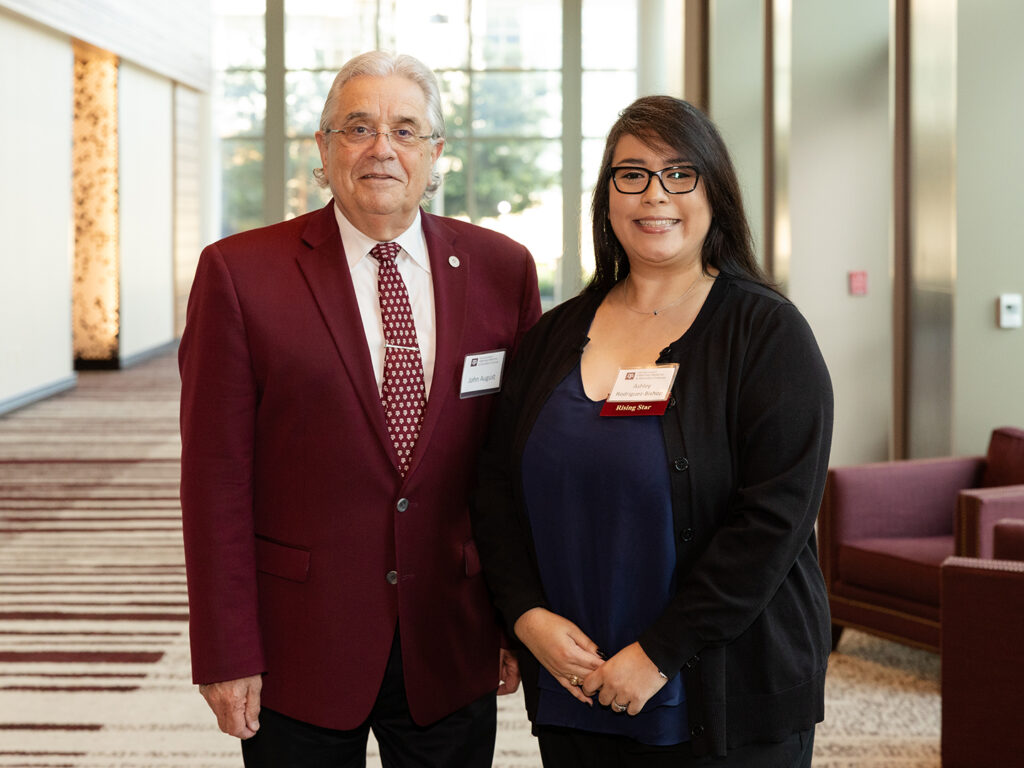
Ashley K. Rodriguez-Bishop demonstrates her dedication to fostering cooperation between veterinarians and shelters as well as applying veterinary epidemiological principles to municipal animal services in her role as the leader of the City of Bryan’s animal services.
Rodriguez-Bishop received her Bachelor of Science degree in biology from the University of Texas at Brownsville (now the University of Texas Rio Grande Valley) and began her veterinary career as an animal care technician at local animal shelters and clinics.
These early career experiences — which focused on low-cost animal management in predominantly Hispanic communities, with the goal of improving both animal and human health — prepared Rodriguez-Bishop for joining the Master of Science degree program in veterinary public health & epidemiology (VPHE) at the Texas A&M College of Veterinary Medicine & Biomedical Sciences.
While a student in the VPHE program, Rodriguez-Bishop was able to gain a deeper understanding of how animal and human health are interrelated.
“Ashley thrived in her degree program, applying her real-life experiences in shelter management to all her coursework,” one nominator shared. “She was even offered positions to teach courses, first as a teaching assistant in courses like Animal Diseases in Comparative Medicine and then in a larger teaching role in a course called Food Hygiene.”
Her kindness and character were also noted by one nominator.
“She served as an assistant for the late Dr. Leon Russell, a senior epidemiologist in our department,” the nominator said. “Not only did Ashley help organize his lectures and maintain all course websites, but she also helped Dr. Russell with his day-to-day life on campus and helped organize all his materials upon his passing.”
After completing her master’s degree in 2016, Rodriguez-Bishop became program coordinator for the City of Bryan Animal Services, where she oversaw fosters, public relations and media, volunteers, and service events for Bryan citizens while also directing all activities and programs for the Bryan Animal Center.
Just two years later, Rodriguez-Bishop’s skills, professional insight, and hard work led her to become animal services supervisor for the City of Bryan, overseeing not only Bryan Animal Center but also Bryan Animal Control.
“Ashley puts into practice all the principles of herd health, public health, zoonotic disease control, and ethical management of animals that she learned in her MS training at the VMBS,” wrote one nominator.
Rodriguez-Bishop’s commitment to bettering the relationship between veterinarians and shelters has also resulted in several collaborations with VMBS faculty and students to study the rates of pathogen transmission and fleas in shelter animals. These collaborations allow students to get hands-on experience volunteering with shelter animals, faculty to get research data for improving animal well-being, and shelter animals to receive a high standard of veterinary care.
“It’s impossible to repay Ashley for the many opportunities she created for our students,” a nominator shared. “She does an amazing job of advocating for animal services against the competing interests in the City of Bryan and should absolutely be an ambassador for the VPHE program and Texas A&M in general.”
A newlywed, Rodriguez-Bishop currently lives in Bryan with her husband, Tyler, and their four rescue chihuahuas — Roo, Gibbs, Ellie, and Lulu — who keep them busy and always laughing. Together, they enjoy fishing at the Texas coast, going to the movies, and gaming. In her free time Rodriguez-Bishop also appreciates a good book and enjoys the sounds of the ocean when she goes back home to the Rio Grande Valley.
Rising Star: Dr. Michelle L. Tucker ‘14
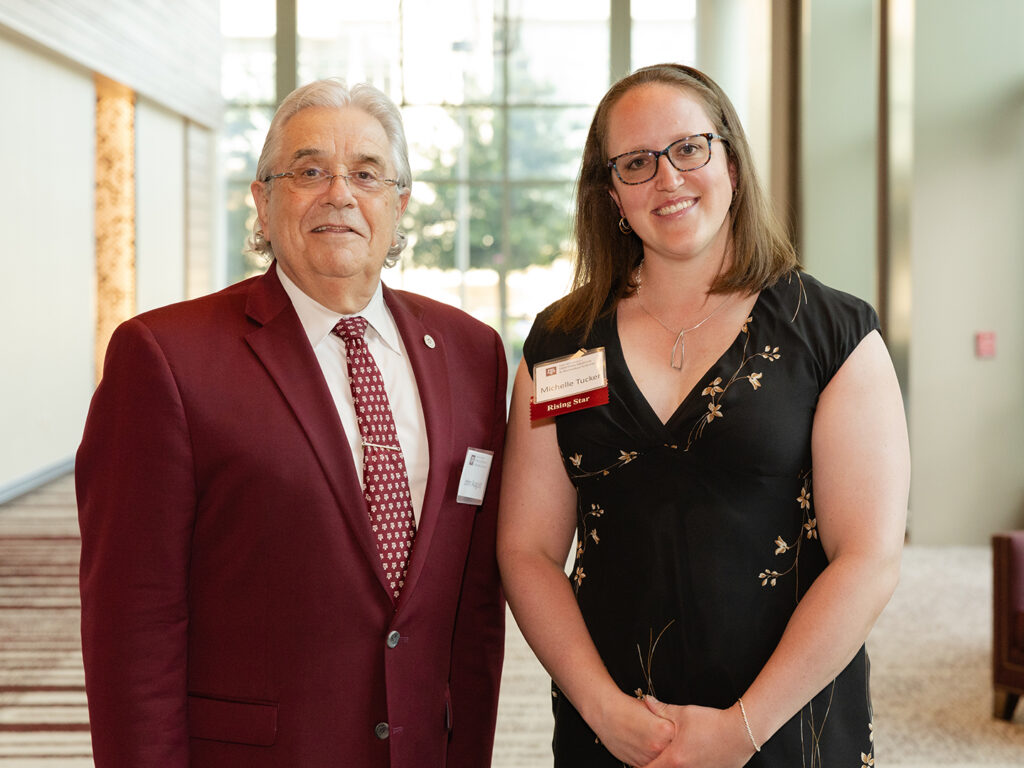
Captivating the attention and admiration of the veterinary community, Dr. Michelle Tucker has emerged as a rising star in large animal surgery, driven by her exceptional surgical skills, passion for research, interdisciplinary knowledge, and mentoring abilities.
After graduating from Texas A&M University with her Doctor of Veterinary Medicine degree in 2014, Tucker completed two equine internships, one in private practice and one at Kansas State University. She then pursued a Ph.D. in large animal clinical sciences from the Western College of Veterinary Medicine at the University of Saskatchewan, where she also completed a residency program in 2020 and became board certified by the American College of Veterinary Surgeons for large animal surgery.
“Dr. Tucker enthusiastically embraced all types of surgical patients, having a penchant for difficult and complex cases,” a nominator said. “Our caseload at Western College is about 70% horses, and the remainder was cattle, sheep, goats, and camelids. She nevertheless took on the non-equine caseload and developed considerable expertise in managing those cases.”
Following the residency program, Tucker joined Purdue University’s College of Veterinary Medicine as an assistant professor of large animal surgery in 2021 and is currently responsible for teaching three surgery courses.
In addition, in 2022, Tucker successfully defended her thesis on using new technology to improve surgical correction of upper airway obstruction in horses, and she is now continuing her research into 3D airway modeling that may be used to predict patient outcomes of different equine surgical procedures.
“Tucker has published her Ph.D. work in top-tier veterinary journals and presented her research at major national and international conferences with the American College of Veterinary Surgeons, the American Association of Equine Practitioners, and the 2022 Calgary International Equine Symposium, where she received the prestigious Platform Presentation Award,” one nominator said. “In the spring of 2023, she received internal funding to continue her research, including funding from the competitive Purdue Equine Research Advisory Board.”
With her bachelor’s degree in biosystems engineering and biology, Tucker has navigated various disciplines to not only expand her own knowledge but also to set a new standard for comprehensive and holistic animal care.
“Dr. Tucker collaborated with many throughout her Ph.D. program and into her post-doctoral position, seeking out relationships with somewhat unexpected groups, such as engineers, physicists, and 3D printing designers,” one nominator said. “I am confident this is the type of interdisciplinary vision that will open countless One Health possibilities for her in the future and keep pushing the boundaries of what veterinary medicine can achieve.”
Beyond her clinical and research achievements, Tucker has embraced the role of student, intern, and resident mentor. Yet her dedication to nurturing talent is not limited to her mentees, as she tends to be available to many students outside of normal hours to help them develop their surgical technique or discuss career goals.
“The thing that makes Dr. Tucker unique is her enthusiasm toward teaching and training future professionals,” one nominator said. “She is selfless, giving, and wholeheartedly devoted to supporting her students. She frequently tells me about anxious or nervous students who sit in her office for hours and the satisfaction she has when she sees their confidence and excitement about equine surgery or research grow after working with them for a few weeks.”
Tucker is also a member of key departmental and hospital committees at Purdue, including the Graduate Student Committee, Intern Committee, and Equine Wellness Forum Committee that is in charge of organizing continuing education meetings for horse owners in the region.
Tucker lives in West Lafayette, Indiana. In her free time, she enjoys walking the local trails, frequenting the gym, attending festivals and activities, cheering on the Purdue basketball team, and visiting her parents and brother in Lexington, Kentucky.
###
For more information about the Texas A&M College of Veterinary Medicine & Biomedical Sciences, please visit our website at vetmed.tamu.edu or join us on Facebook, Instagram, and Twitter.
Contact Information: Jennifer Gauntt, Director of VMBS Communications, Texas A&M College of Veterinary Medicine & Biomedical Sciences, jgauntt@cvm.tamu.edu, 979-862-4216


